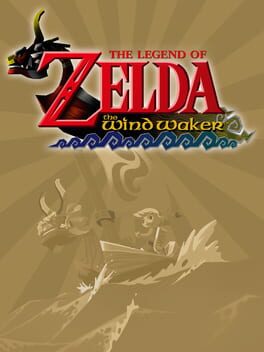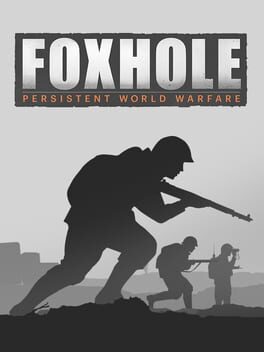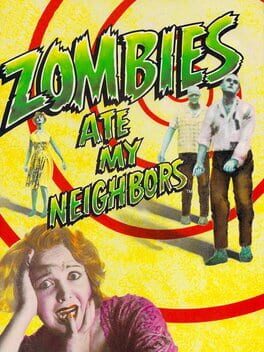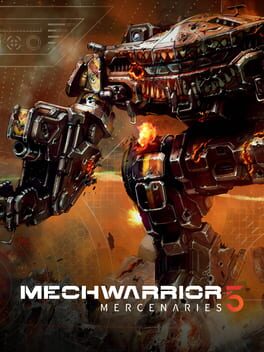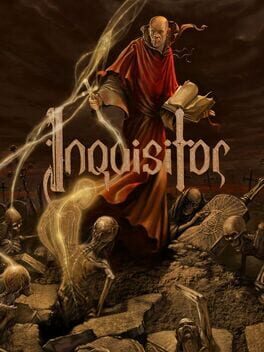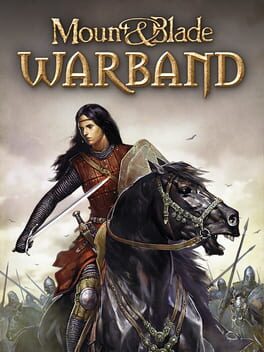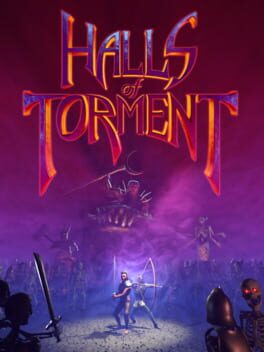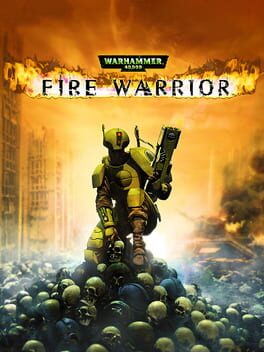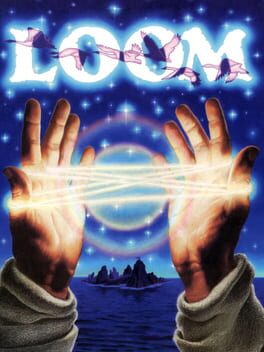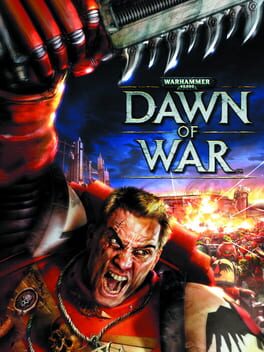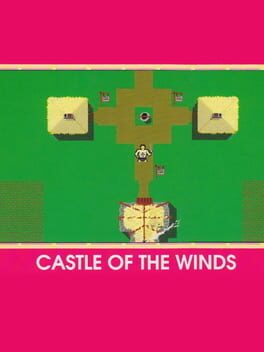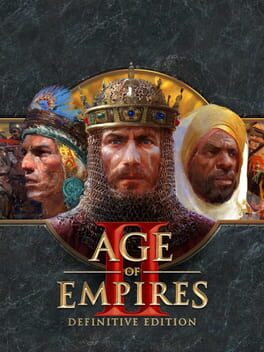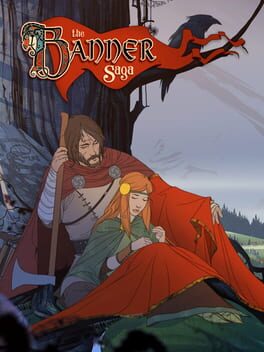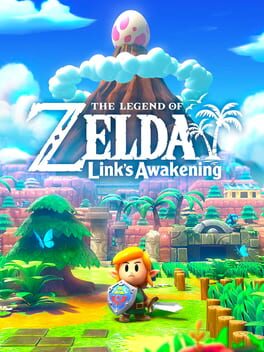Doodstormer
1989
I have often said that no matter what your opinion may be of particular games in the series, Zelda holds the unique distinction among other franchises of its size that there is not a single canon entry that is truly a "bad game".
In this franchise with such an immense honor bestowed upon it, Wind Waker is the jewel in its crown, the pinnacle of everything that makes a Zelda game good. A grand world-spanning, swashbuckling epic adventure with exciting battles, challenging dungeons, and a riveting storyline that keep you glued to the controller from start to end. Link's Awakening was the game that introduced me into Zelda, but Wind Waker was the game that made me a true Zeldahead.
In this franchise with such an immense honor bestowed upon it, Wind Waker is the jewel in its crown, the pinnacle of everything that makes a Zelda game good. A grand world-spanning, swashbuckling epic adventure with exciting battles, challenging dungeons, and a riveting storyline that keep you glued to the controller from start to end. Link's Awakening was the game that introduced me into Zelda, but Wind Waker was the game that made me a true Zeldahead.
2017
Absolute banger of a game, probably one of the all-time greats in the realm of co-op arcade shooters. Every little inch of the game oozes with personality and charm, and finding out what weapons are weaknesses to certain monsters is a blast of cartoon logic and panicked desperation.
What really sets this already excellent game so high above its peers is its sheer volume - there are 50 stages that ensure that you and your co-op buddy of choice are not going to be just blasting through the whole game in one sitting, you will be jotting down those passwords all the way to the end, and once you finish it, it won't be long before you are starting the whole thing all over again.
What really sets this already excellent game so high above its peers is its sheer volume - there are 50 stages that ensure that you and your co-op buddy of choice are not going to be just blasting through the whole game in one sitting, you will be jotting down those passwords all the way to the end, and once you finish it, it won't be long before you are starting the whole thing all over again.
The triumphant return of the Battletech franchise from the shackles of IP squatting bullshit has been nothing short of glorious to behold, and Mechwarrior 5 is an incredibly strong return to glory for the beloved Giant Death Machine Sim genre.
The "driving a big mech" element of the game has been improved upon and delivers exactly what the franchise is most loved for, and the management of the mechs and your squad, while a bit limited, show a recognition of the deeper elements of the series that is so beloved. There's a fantastic spread of great mech choices and a few deep cuts, and the game has an ongoing timeline that parallels the in-canon history to drip in new mechs, weapons, upgrades, and variants so that you are constantly having new things to go searching for in other sectors.
Where things are a bit more mixed is the Mount & Blade style open world, randomly generated missions format. While very fun conceptually, the missions themselves are extremely limited in variety, and the difficulty scaling is frankly absurd, which makes the campaign/career format unfortunately a bit repetitious and once you purchase heavy/assault mechs the game sort of reaches its limits. There are some bespoke, constructed campaigns strewn throughout both in the base game and in several DLCs that are excellent and add a refreshing bit of variety to the formula, but they can only do so much when they are so few in number compared to the random missions that provide the bulk of the player's income and salvage.
However in spite of this the game has everything going for it, and it bodes extremely well for the future of the franchise.
The "driving a big mech" element of the game has been improved upon and delivers exactly what the franchise is most loved for, and the management of the mechs and your squad, while a bit limited, show a recognition of the deeper elements of the series that is so beloved. There's a fantastic spread of great mech choices and a few deep cuts, and the game has an ongoing timeline that parallels the in-canon history to drip in new mechs, weapons, upgrades, and variants so that you are constantly having new things to go searching for in other sectors.
Where things are a bit more mixed is the Mount & Blade style open world, randomly generated missions format. While very fun conceptually, the missions themselves are extremely limited in variety, and the difficulty scaling is frankly absurd, which makes the campaign/career format unfortunately a bit repetitious and once you purchase heavy/assault mechs the game sort of reaches its limits. There are some bespoke, constructed campaigns strewn throughout both in the base game and in several DLCs that are excellent and add a refreshing bit of variety to the formula, but they can only do so much when they are so few in number compared to the random missions that provide the bulk of the player's income and salvage.
However in spite of this the game has everything going for it, and it bodes extremely well for the future of the franchise.
2012
An incredibly rich world of intrigue and corruption where you must unravel a vast conspiracy and solve mysteries in a medieval European setting. The investigations are exciting and interrogation of suspects and gathering evidence is a lot of fun. The not-quite-Catholic world that the game takes place in is a fascinating setting and every single item in the game has extensive lore that expounds upon the larger world and its history, and you will probably spend more than a few hours just gazing at every single little object you find to learn more.
Unfortunately, the other 90% of the game is a terrible nightmare of bad combat, bad encounter design, bad creature balance, and bad dungeons that will take you a fucking eternity to clear, even with cheats which are probably the only way to make the tedious chore of the dungeon crawling bearable. You also have no choice but to clear every single one because that's where the necessary evidence or characters or boss encounters are to advance the good part of the game and return to the "being an Inquisitor" part of Inquisitor.
The game took 10 years to make and 3 more to translate it all into English and if you try to play it cleanly you will be fighting those awful dungeons for 10 years too
Unfortunately, the other 90% of the game is a terrible nightmare of bad combat, bad encounter design, bad creature balance, and bad dungeons that will take you a fucking eternity to clear, even with cheats which are probably the only way to make the tedious chore of the dungeon crawling bearable. You also have no choice but to clear every single one because that's where the necessary evidence or characters or boss encounters are to advance the good part of the game and return to the "being an Inquisitor" part of Inquisitor.
The game took 10 years to make and 3 more to translate it all into English and if you try to play it cleanly you will be fighting those awful dungeons for 10 years too
It's ugly to look at, it's clumsy to play, the AI is stupid as rocks, the economy is bad, the music and voice work are incomplete and repetitive, and it's probably the very best medieval warlord rpg you'll ever play. Hundreds of scholars and game designers and larpers have all collectively spent millions of dollars and thousands of hours laboring in vain to create something even half as visceral and authentic as the experience of exhaustedly flailing away at a hundred shit covered peasants with a battle axe brought to us by this game.
Why can nobody else learn anything from what this game has taught us? How has nobody made mounted combat feel even half as good as this? How has nobody made spears and halberds even a little bit as fun to play with? Perhaps the off-putting and janky exterior of this game serves as a protective armor that keeps it safely hidden, the most precious secret of the Turks.
Why can nobody else learn anything from what this game has taught us? How has nobody made mounted combat feel even half as good as this? How has nobody made spears and halberds even a little bit as fun to play with? Perhaps the off-putting and janky exterior of this game serves as a protective armor that keeps it safely hidden, the most precious secret of the Turks.
2023
The absolute feeding frenzy that ensued when Vampire Survivors struck it big was short lived, as while most saw the simplistic gameplay loop and almost insultingly low effort aesthetic direction of the game as an invitation for imitation, there were very few who had any of the imagination or skill to surpass the original game in more than superficial ways.
Halls of Torment does not fall into any of those pitfalls, seeing the genre rightfully as something that should be experimented with and expanded upon. The choice to pastiche Diablo both aesthetically and mechanically was a wise one and bears fruit for the game in a vast multitude of areas and makes the entire experience feel more like a sort of a high speed low drag ARPG instead of a madness inducing slot machine that preys on the part of your brain that tells you to sort your skittles by color before eating them.
Halls of Torment does not fall into any of those pitfalls, seeing the genre rightfully as something that should be experimented with and expanded upon. The choice to pastiche Diablo both aesthetically and mechanically was a wise one and bears fruit for the game in a vast multitude of areas and makes the entire experience feel more like a sort of a high speed low drag ARPG instead of a madness inducing slot machine that preys on the part of your brain that tells you to sort your skittles by color before eating them.
1990
ASK ME ABOUT LOOM
Often people who have no idea what point and click adventure games are will very confidently tell you that the genre died because it was too reliant on "moon logic" and nobody had any patience for it. Disregarding that these people probably consider filing their tax returns to also be "moon logic", it shows just how little people understand about what made the genre such a widely popular staple of PC gaming for so long.
Monkey Island, Myst, Kings Quest, 7th Guest, all of these games were so much more than a simple string of progress blockers that everyone just had to deal with, they were truly adventures that the game took you on with the puzzles and object trading only being a fragment of the whole. The idea of games being merely sets of challenges to overcome has led people to think of point and click adventure games as some sort of "solved" riddle, the only reason to play being to win and the singular solutions being laid out in walkthroughs an indication of their humiliating defeat. After all, the game is beaten and will always be beaten in the same way, the road is completely paved.
It's games like Loom that really bring out the heart and soul of a point and click, taking away some of the usual tools of its peers and replacing them with a simple Casio keyboard and inviting you to push the buttons and see what happens. There's nothing complicated about playing Loom, and yet its simple loop of "repeat after me" discovery and experimentation is one that is immediately immersive and finds you soon embroiled in its simple world of cities where everybody has one job.
Loom is incredibly charming and is perhaps the chief example of why we once called this genre "adventure" games. Others have walked the same road, but the walking is not the road.
Often people who have no idea what point and click adventure games are will very confidently tell you that the genre died because it was too reliant on "moon logic" and nobody had any patience for it. Disregarding that these people probably consider filing their tax returns to also be "moon logic", it shows just how little people understand about what made the genre such a widely popular staple of PC gaming for so long.
Monkey Island, Myst, Kings Quest, 7th Guest, all of these games were so much more than a simple string of progress blockers that everyone just had to deal with, they were truly adventures that the game took you on with the puzzles and object trading only being a fragment of the whole. The idea of games being merely sets of challenges to overcome has led people to think of point and click adventure games as some sort of "solved" riddle, the only reason to play being to win and the singular solutions being laid out in walkthroughs an indication of their humiliating defeat. After all, the game is beaten and will always be beaten in the same way, the road is completely paved.
It's games like Loom that really bring out the heart and soul of a point and click, taking away some of the usual tools of its peers and replacing them with a simple Casio keyboard and inviting you to push the buttons and see what happens. There's nothing complicated about playing Loom, and yet its simple loop of "repeat after me" discovery and experimentation is one that is immediately immersive and finds you soon embroiled in its simple world of cities where everybody has one job.
Loom is incredibly charming and is perhaps the chief example of why we once called this genre "adventure" games. Others have walked the same road, but the walking is not the road.
There's something oddly appropriate about the most famous and beloved 40k game being a janky melodramatic mess that was slowly iterated upon and improved in further releases, started getting meddled with towards the end by nonsensical demands for product tie-ins, and then was dropped unceremoniously for much worse sequels that failed to learn anything from the previous incarnations.
The game itself is alright now that it is safe from any further meddling but much like the voice lines that every 40k fanboy knows better than their own codex it wears out its welcome after only a couple repetitions.
The game itself is alright now that it is safe from any further meddling but much like the voice lines that every 40k fanboy knows better than their own codex it wears out its welcome after only a couple repetitions.
1994
I often find myself liking a game far more when it has ambitious ideas than if it necessarily accomplishes everything it is aiming for with perfect grace. Castle of the Winds is a really good example of this sort of thing - it aspires to be something far bigger than it can truly accomplish, even needing to be split into 2 games (this is my review for that game too, lol) to fit all that it wants to be.
This is an RPG that gives you a grand storyline of revenge and takes you from massive dungeon to massive dungeon, from city to city, from world to world.... all about a screen or two away from one another, and comfortably finished in a few hours once you find a big enough sword. You can see at every seam of this game how it wanted to be even bigger and even grander, but was literally limited by the hardware it was made on. But instead of just abandoning its ambitions it trucks right along, confident in itself that perhaps, just maybe, you the player will set aside your criticizing and skepticism and join it in its own world of pretend swords and sorcery and giants.
The biggest and most fascinating part of the game is its inventory management system - while most games of this type tend to be some variation of finite slots and weight capacity, Castle of the Winds utilizes a "mass" system that allocates items as having literal dimensions that affect the limit of how much you can carry - not as a tetris grid like Diablo and its ilk, but as just a constant calculation which you can offset by putting some of your things into boxes, which themselves take up mass... It's this sort of thing that truly sets apart classic RPGs from the modern genres they spawned, the sort of aimless curiosity about things that now are so settled that any deviation is treated as "bad design" by people who have a go-to McDonald's order memorized.
Epic Games published this back in 1994 and yet even now as we approach its 30th birthday there has not been a single whisper of a remaster or remake of Castle of the Winds and this should fill you with a sense of mild irritation, like a slightly out of sync oven clock.
This is an RPG that gives you a grand storyline of revenge and takes you from massive dungeon to massive dungeon, from city to city, from world to world.... all about a screen or two away from one another, and comfortably finished in a few hours once you find a big enough sword. You can see at every seam of this game how it wanted to be even bigger and even grander, but was literally limited by the hardware it was made on. But instead of just abandoning its ambitions it trucks right along, confident in itself that perhaps, just maybe, you the player will set aside your criticizing and skepticism and join it in its own world of pretend swords and sorcery and giants.
The biggest and most fascinating part of the game is its inventory management system - while most games of this type tend to be some variation of finite slots and weight capacity, Castle of the Winds utilizes a "mass" system that allocates items as having literal dimensions that affect the limit of how much you can carry - not as a tetris grid like Diablo and its ilk, but as just a constant calculation which you can offset by putting some of your things into boxes, which themselves take up mass... It's this sort of thing that truly sets apart classic RPGs from the modern genres they spawned, the sort of aimless curiosity about things that now are so settled that any deviation is treated as "bad design" by people who have a go-to McDonald's order memorized.
Epic Games published this back in 1994 and yet even now as we approach its 30th birthday there has not been a single whisper of a remaster or remake of Castle of the Winds and this should fill you with a sense of mild irritation, like a slightly out of sync oven clock.
Gordon Ramsay is often regarded by most regular folk as being one of the greatest chefs alive, and even those who dislike his irascible personality would be dishonest to deny that he exhibits a great expertise as a chef. However, Gordon Ramsay does not understand burgers. His burgers are awful, overbloated, needlessly extravagant, and even the man himself needs to break out a fork and knife just to eat the monstrosities he constructs for the camera. Gordon Ramsay is a gourmet chef, buying a meal at one of his restaurants runs you like $150, and you will surely find it worth the expense. But this kind of man is simply not suited to be making burgers, a food perhaps most commonly known for being $7 with bad fries and an enormous drink and consumed while hurtling down the freeway in a Range Rover.
Age of Empires 2: Definitive edition is like if you tasked Gordon Ramsay with remaking a burger your dad made on the grill with nothing but his good intentions and a budget of about $20. It's huge, it's garish, it's got 4 times the civilizations, all the campaigns are totally remastered with lovingly detailed new maps and voice work and new intros, there's constant care given to preserving competitive balance and even new units and game mechanics being added pretty much twice a year.
And it fucking sucks. There's little if any consideration in DE given for what really made the original game such a massive hit, just sort of a strange condescending idea of "improvement" as the sole intention rather than any kind of preservation or remastering of the original game. The new campaigns are bloated and almost universally are simple "play a deathmatch against 7 AIs" style slogs with the occasional endurance run, the new civs pour in so rapidly that it is impossible to really find how to fit them in before another DLC rolls along with 3 more, and the insistence on replacing nearly every trace of the original game with new assets leaves even the old content feeling like a hollow mockery of the charm the original once held. It's trying very hard to take a game you bought for $20 to play at LAN parties with your buddies into some kind of AAA pastiche of that simple joy.
The original game is indeed still in there, somewhere, and is faithfully reconstructed aside from all the changes made to suit the game's frankly psychotic base of competitive players that seem to have completely overtaken any place the game is discussed, but ultimately even that little bit of the original is just finding out that Gordon Ramsay and your dad bought the same beef patties.
Age of Empires 2: Definitive edition is like if you tasked Gordon Ramsay with remaking a burger your dad made on the grill with nothing but his good intentions and a budget of about $20. It's huge, it's garish, it's got 4 times the civilizations, all the campaigns are totally remastered with lovingly detailed new maps and voice work and new intros, there's constant care given to preserving competitive balance and even new units and game mechanics being added pretty much twice a year.
And it fucking sucks. There's little if any consideration in DE given for what really made the original game such a massive hit, just sort of a strange condescending idea of "improvement" as the sole intention rather than any kind of preservation or remastering of the original game. The new campaigns are bloated and almost universally are simple "play a deathmatch against 7 AIs" style slogs with the occasional endurance run, the new civs pour in so rapidly that it is impossible to really find how to fit them in before another DLC rolls along with 3 more, and the insistence on replacing nearly every trace of the original game with new assets leaves even the old content feeling like a hollow mockery of the charm the original once held. It's trying very hard to take a game you bought for $20 to play at LAN parties with your buddies into some kind of AAA pastiche of that simple joy.
The original game is indeed still in there, somewhere, and is faithfully reconstructed aside from all the changes made to suit the game's frankly psychotic base of competitive players that seem to have completely overtaken any place the game is discussed, but ultimately even that little bit of the original is just finding out that Gordon Ramsay and your dad bought the same beef patties.
2014
It is commonly advised and encouraged in game design to frontload the first hour of your game with as much presentation and polish and pizzazz as you possibly can, as that first hour is the part where you are doing everything in your power to entice a player to carry on through into the rest of your game knowing that what they just saw hooked them in.
It's also a good idea to save some of that sauce for the rest of your game.
It's also a good idea to save some of that sauce for the rest of your game.
For every Zelda fan, we have The One We Started With, The Good One, and The One We Irrationally Hate In Spite Of It Being Perfectly Good. My very first Zelda game was Link's Awakening DX, which is a funny entry point considering it kind of just has fuck all to do with any of the other games and even has Mario characters in it and other wild off-the-wall shit that has given Link's Awakening something of a reputation for being the goofball one.
Well, goofball one or not it was enough to ruin my brain and make me a Zelda freak 4 lyfe. It brought together all of the real magic of Zelda into a nice compact little game for car trips; a whimsical but dark world, a wide cast of fascinating characters, and a story that makes the game paradoxically linked to several others to make dweebs that think the timeline is real constantly fight about it.
The remake was, happily, exactly what a remake should be - a modernized but fully faithful adaptation of the original game. The newer interface makes it easier to work with the items and spend a little less time doing on-the-fly juggling of common-use gear, the music is beautiful as has become a standard for Zelda, and the graphics are a charming compromise between modern 3D and the classic gameboy Zelda graphics. It feels very much like a storybook brought to life, which is an appropriate take on something so integral to my childhood being brought forth into the 20th century, happily not kicking and screaming like so many others of its ilk.
Also the dungeon building minigame was fun. Took like 20 minutes to do all the missions that tie to in-game collectibles and the rest are optional so really don't see any merit to all the whining about that. You don't have to do everything in a game, man.
Well, goofball one or not it was enough to ruin my brain and make me a Zelda freak 4 lyfe. It brought together all of the real magic of Zelda into a nice compact little game for car trips; a whimsical but dark world, a wide cast of fascinating characters, and a story that makes the game paradoxically linked to several others to make dweebs that think the timeline is real constantly fight about it.
The remake was, happily, exactly what a remake should be - a modernized but fully faithful adaptation of the original game. The newer interface makes it easier to work with the items and spend a little less time doing on-the-fly juggling of common-use gear, the music is beautiful as has become a standard for Zelda, and the graphics are a charming compromise between modern 3D and the classic gameboy Zelda graphics. It feels very much like a storybook brought to life, which is an appropriate take on something so integral to my childhood being brought forth into the 20th century, happily not kicking and screaming like so many others of its ilk.
Also the dungeon building minigame was fun. Took like 20 minutes to do all the missions that tie to in-game collectibles and the rest are optional so really don't see any merit to all the whining about that. You don't have to do everything in a game, man.

